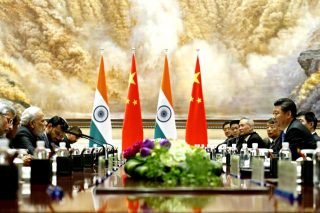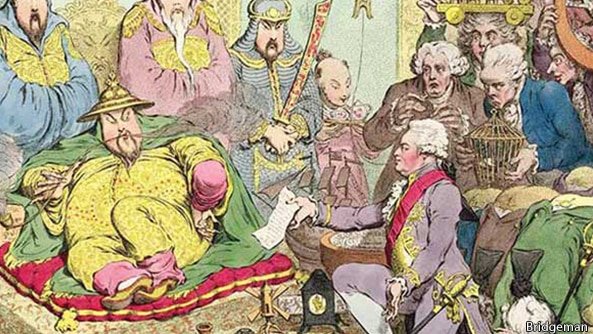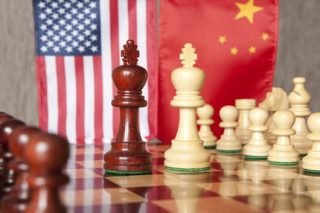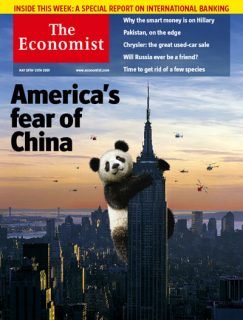
by Salman Rafi Sheikh, …with New Eastern Outlook, Moscow
[ Editor’s Note: The US love-hate relationship with China continues like a battered marriage. While working hard to do a new trade deal, which both sides want, the US still wants to dominate China, which of course is not a good deal for China.
But while China has the fastest growing economy, the US still has the biggest military, the US dollar, and control of the banking system as part of its financial army. China holds a ton of US debt as a currency life preserver.

Western businesses flocked to China, helping it to grow faster and to get a piece of the Chinese pie. Now some countries are selling us that China was not a bogeyman back then, but is now.
No one seems to be embarrassed how a backward Chinese communist power built the big economy it has, with the West holding its hand most of the way. As for the Europeans, Italy landed a big port deal with China, and Germany has its arms wide open.
So like love, it appears that national security threats are also in the eye of the beholder. I suspect this is going to be a big mess for some time. And it might get crazier if Trump closes a big trade deal claiming he whupped Xi, and yet the Pentagon has China listed as public enemy number one… Jim W. Dean ]
 Jim's Editor’s Notes are solely crowdfunded via PayPal
Jim's Editor’s Notes are solely crowdfunded via PayPal
Jim's work includes research, field trips, Heritage TV Legacy archiving & more. Thanks for helping. Click to donate >>

– First published … March 30, 2019 –
Although a South China Morning Post news article of March 9 tried to dismiss a popular notion that there is going on a ‘clash of civilisations’ between the US and China and further showed that the present conflict between the two states could potentially be resolved by “reaching for universalist rather than nationalist values and principles”, the so-called universalism would remain a utopia as long as the nation-state continues to be the primary unit of international order, keeping the primacy of nationalist values and interests over universal.
Its illustration can also be found in the strategic and security postures that the U.S., the so-called super-power clinging to the out-dated notion of unilateral hegemony, continues to develop in order to resist other powers’ rise and prevent its own downfall as the sole super-power.
A December-January report of the Pentagon to US Congress made the case clear that China is the US’ enemy number one and that the U.S. must do all it can to maintain its position and prevent Chinese influence in the world.
Therefore, despite all talks of trade-deal between the US and China, this deal would do very little to nothing to turn China’s status as a “revisionist power” in the eyes of the US.
It essentially sees China as a power “actively competing against the United States and our allies and partners, in a fundamentally political contest between those who favor repressive societies and those who favor free societies.
China specifically seeks to displace the United States in the Indo-Pacific region, expand the reaches of its state-driven economic model, and reorder the region in its favor as the preeminent power.”

The US thus essentially sees China in antagonistic terms despite the fact that Chinese officials, including Xi, have been stressing the construction of an international “community of common human destiny,”—specifically, the world of shared universal values.
For the US, however, the Chinese discourse of ‘internationalism’ is nothing but an attempt to carve out “a higher-profile role in existing regional and global institutions, while selectively pursuing the establishment of new multilateral mechanisms”, something that would enable China to establish its own domination.
Accordingly, the US establishment sees everything that China does in essentially strategic perspective. For example, the Pentagon’s reflections on China’s Belt & Road Initiative or OBOR is that this project does not merely serve economic purposes but also “a greater strategic purpose.
China intends to use OBOR to develop strong economic ties with other countries, shape their interests to align with China’s, and deter confrontation or criticism of China’s approach to or stance on sensitive issues. Countries participating in OBOR can develop economic dependencies from over-reliance on Chinese capital and labor.
Some OBOR investments could create potential military advantages for China, should it require access to selected foreign ports to preposition the necessary logistics support to sustain naval deployments to protect its growing interests in waters as distant as the Indian Ocean, Mediterranean Sea, and Atlantic Ocean.”
This is being bolstered by Chinese mega-investments across the globe that have amounted to, according to the Pentagon report, “$299 billion in Europe, $223 billion in North America, $120 billion in East and Southeast Asia, $98 billion in South America, $91 billion in Australia, $85 billion in West Asia (South Asia, Central Asia, and Russia), $77 billion in Sub-Saharan Africa, and $31 billion in the Middle East and North Africa” between 2006 and 2017.

The US therefore needs to counter what the DoD calls “problems” emanating from Chinese expansion.
The Pentagon report specifically mentions four areas: “building a more lethal force to gain military advantage, strengthening allies and partners to generate robust networks that can advance shared interests, reforming the Department to realize greater performance and affordability, and expanding the competitive space to create US advantages and impose dilemmas on competitors.”
The case involving Huawei has become of particular importance in this behalf. It is according to the strategic perspective laid out in this four-tier strategy that the US has been really stepping up pressure on its allies to limit Huawei’s ability to do business in their markets.
These developments tend strongly to cast gloomy shadows over prospects of ‘all getting along well’ after the US-China trade deal; for, this deal is never going to be enough to end the inter-state rivalry that has its roots in the anarchical structure of international politics whereby powerful states resist the rise of new (powerful states) through all means available at their disposal, and the new states tend to out-do the previous hegemons through non-aggressive but potentially powerful means.
The US – China rivalry is, accordingly, only beginning to become truly global. The US would need powerful allies on its side, but the US president’s own criticism of their NATO allies seems that Donald Trump isn’t well prepared to really counter China.
Salman Rafi Sheikh, research-analyst of International Relations and Pakistan’s foreign and domestic affairs, exclusively for the online magazine “New Eastern Outlook”.

Jim W. Dean is VT Editor Emeritus. He was an active editor on VT from 2010-2022. He was involved in operations, development, and writing, plus an active schedule of TV and radio interviews. He now writes and posts periodically for VT.
ATTENTION READERS
We See The World From All Sides and Want YOU To Be Fully InformedIn fact, intentional disinformation is a disgraceful scourge in media today. So to assuage any possible errant incorrect information posted herein, we strongly encourage you to seek corroboration from other non-VT sources before forming an educated opinion.
About VT - Policies & Disclosures - Comment Policy




This is Sheer Tomfoolery by the Americans in charge ……… this is going to lead to unimaginable terrible consequences ……. IF these Fukin Liars keep up with this Bullshit of a Threat to USA From China then soon it will be Real ……. I wonder How much Bullshit that the Chinese take of this King Onlt to Reply with Real Percieved Threats to USA ………… Right now China is no threat to anybody …….. BTW the Chinese say that the Chinese built the Great Wall to Keep Barbarians out and that China does Not Believe in Attacking Others …….. BUT if These Idiots keep up with this nonsense then China will Eventually be Forced to Give the USA a Real Threat ………….. Given the Masses of Chinese
People They can afford Many a Martyropleand then Given the Technology Israel Sells to China then they can produce any New Weapon and With the Chinese Economy there can be Real significant Investments in destroying USA …………. These Clowns need to Quit Fukin Around with bullshit unless They want a Real Headache of an Enemity …….
Correct but they used USA to fulfill there desire.
Early summer 2001: Listening in Oslo Norway to a talk by the newly returned Norwegian foreign office commercial attaché to Bĕijing telling Norwegian traders and investors this much, that “Until now, trade and investments and getting established in (mainland) China has encountered a lot of obstacles and restrictions that have now been lifted…”
I half expected him to tell the assembled Oslo business notables to be told what the Chinese government restrictions had been overcome or abolished, but no:
He ecplained that “Now much more will be allowed, since the US now controlles all shipping lanes along which China must import its oil and natural gas to feed it’s economic growth”. In other words, he explained that now the Yankees had the grip on the Chinamen ‘by their balls’. Or “grabbed their pussies”, like a wealthy inheritor of a Brooklyn brothel owner so elegantly likes to put it.
Little — I think — did he mull about tha fact that just in front of him, a few chairs away from me — sat a perfectly Caucasian-looking youngster who put down the speaker’s words on paper there in plain Chinese.
I suspect Chinese must have acted likewise thus for tens of years bidding their time to make some constructive counter-offers to the beneficial advantages for all interested partners.
Comments are closed.